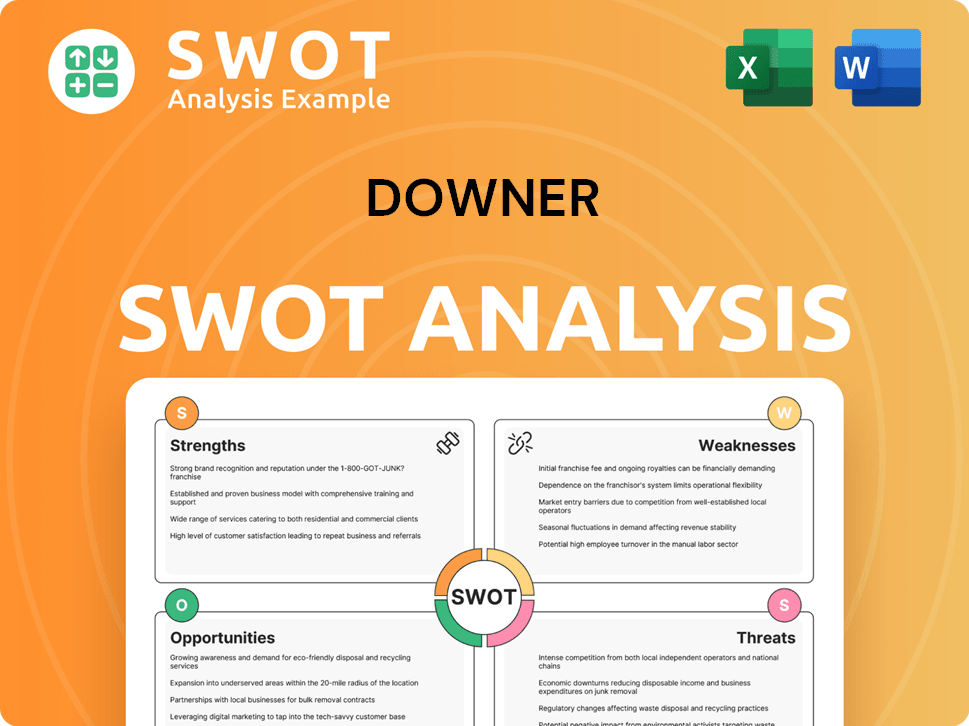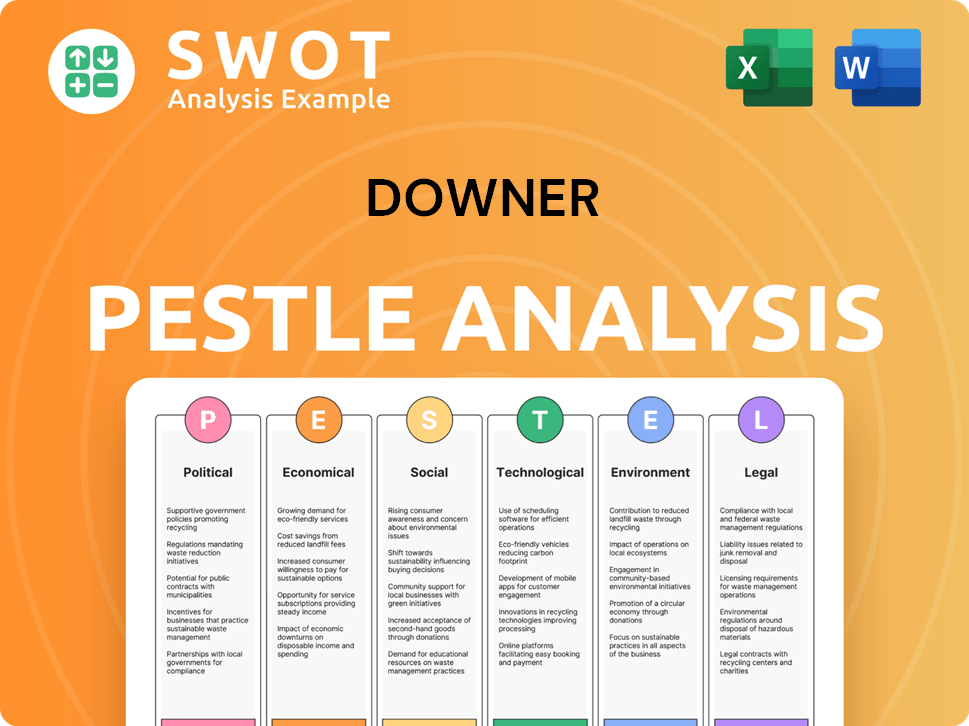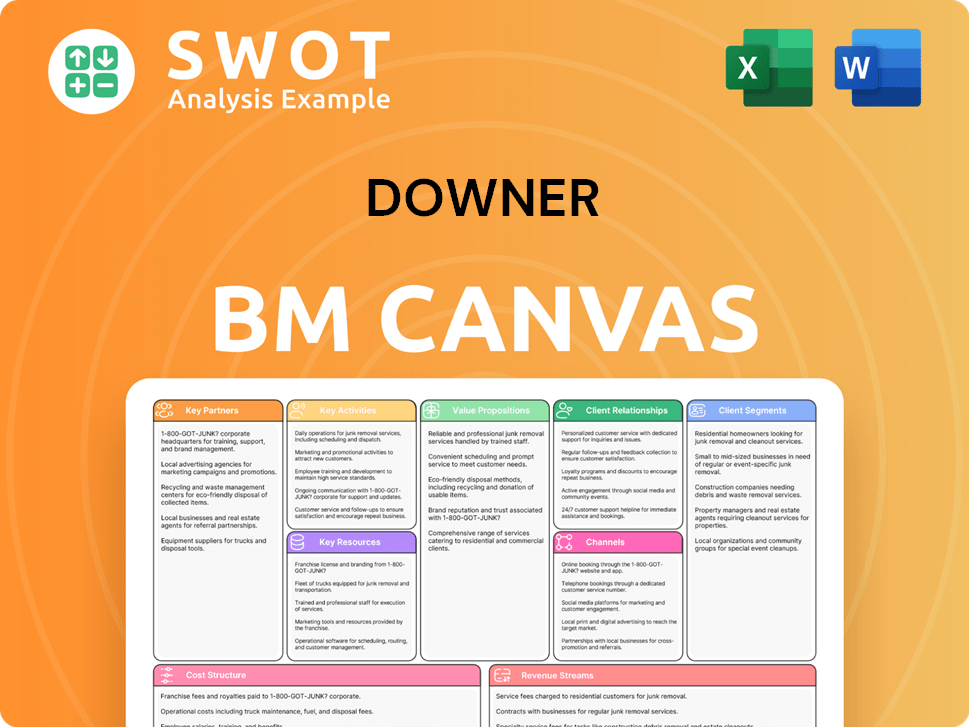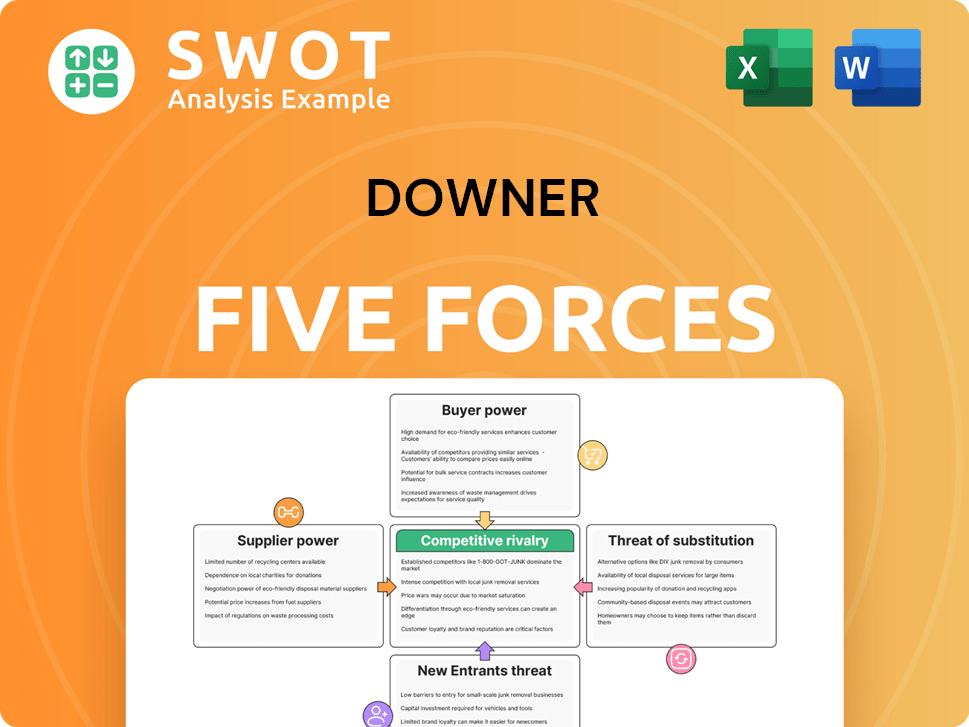Downer Bundle
How is Downer Company Redefining Infrastructure Services Sales?
Downer, a 165-year-old integrated services giant, has dramatically reshaped its sales and marketing approach. This transformation, highlighted by its "Enabling communities to thrive" purpose launched in July 2024, signals a major shift in how it engages with the market. Discover how Downer Company sales strategy has evolved to prioritize long-term partnerships and community impact, moving beyond its traditional transactional focus.

This exploration delves into the Downer SWOT Analysis to understand its strategic shifts. We'll examine Downer Company marketing strategy, including its digital marketing strategy, and how it navigates the competitive landscape. You'll gain insights into Downer's business development, including its sales and marketing tactics, and the core elements of its strategic planning process, all while analyzing its impressive financial performance, including a 17.7% increase in underlying EBITA in FY24.
How Does Downer Reach Its Customers?
The sales strategy of the company primarily revolves around direct sales, focusing on securing large-scale contracts. This approach is particularly effective in the infrastructure and services sectors where the company operates. The company's sales efforts are heavily concentrated on government and blue-chip clients across Australia and New Zealand, reflecting a strategic focus on long-term partnerships.
The company's sales channels are designed to capitalize on its strengths in tendering and bidding for significant projects. This strategy is supported by its extensive technical capabilities and established relationships with both local and state governments. This approach allows the company to secure a consistent stream of revenue, particularly through recurring contract work.
The company has strategically shifted its focus from asset-heavy mining operations to capital-light urban services. This shift includes sectors like rail, water, road, and telecommunications. This strategic realignment allows the company to concentrate on recurring contract work, with a significant portion of its work-in-hand portfolio being services-related, which provides stability and predictability in its revenue streams.
The company's primary sales strategy involves a direct sales model. This focuses on securing large-scale, long-term contracts with government and blue-chip clients. The direct engagement with public sector entities is a key aspect of the company's business development, particularly for critical infrastructure projects.
A robust tendering and bidding process supports the direct sales model. This leverages the company's scale, technical capabilities, and established relationships. This process is essential for securing and managing large-scale infrastructure projects, which are core to the company's revenue generation.
The company has strategically shifted away from asset-heavy mining operations towards capital-light urban services. This includes sectors like rail, water, road, and telecommunications. This shift allows the company to focus on recurring contract work, enhancing revenue stability.
Key partnerships and exclusive distribution deals are crucial for growth and market share. Long-term agreements for rail maintenance and new contracts like the NZ$600 million electricity field services contract with Powerco, starting in July 2025, and a seven-year Field Services Agreement with Chorus Limited, commencing April 1, 2025, are examples.
The company's sales strategy is multifaceted, involving direct sales, strategic partnerships, and a focus on recurring revenue. This approach is designed to ensure a consistent stream of income and market stability. The company's ability to secure and manage large-scale projects through effective tendering and bidding processes is critical to its success. For more insights, explore the Growth Strategy of Downer.
- Direct Sales: The primary sales channel, focusing on government and blue-chip clients.
- Tendering and Bidding: A robust process leveraging the company's capabilities.
- Strategic Shift: Transitioning from asset-heavy mining to capital-light urban services.
- Partnerships: Long-term agreements and exclusive deals for recurring revenue.
Downer SWOT Analysis
- Complete SWOT Breakdown
- Fully Customizable
- Editable in Excel & Word
- Professional Formatting
- Investor-Ready Format

What Marketing Tactics Does Downer Use?
The Owners & Shareholders of Downer company employs a multifaceted marketing approach, primarily focusing on its B2B and government clients. This strategy involves a blend of digital and traditional tactics to build brand awareness, generate leads, and drive sales. The company's marketing efforts are geared toward showcasing its capabilities in infrastructure, engineering, and related services.
Downer's sales and marketing strategy leverages digital channels for corporate communication, thought leadership, and talent acquisition. The company's website serves as a central hub for news, case studies, and investor relations, highlighting project successes and providing updates on its activities. This approach is complemented by participation in industry events and conferences, as well as corporate announcements.
The company's marketing mix emphasizes its commitment to sustainability and community impact. Downer's marketing efforts are designed to reflect its purpose of 'Enabling communities to thrive', as demonstrated in its 2024 Sustainability Report and various community partnerships. This focus helps to enhance brand reputation and maintain a strong social license to operate.
Downer utilizes its website as a central hub for news, case studies, and investor relations, providing updates on projects and activities.
The company invests in technologies like Augmented Reality (AR) to modernize preventative maintenance tasks, allowing for data-driven insights and improved efficiency.
Downer participates in industry events and conferences to reach a broader audience of shareholders and stakeholders.
The company makes corporate announcements and holds annual general meetings, often webcast live, to reach a wider audience.
Downer emphasizes its commitment to sustainability and community impact, as highlighted in its 'Enabling communities to thrive' purpose and its 2024 Sustainability Report.
The company engages in community partnerships, such as supporting the Winiata Marae water science lab in May 2025, to contribute to its brand reputation.
Downer's sales and marketing tactics include a combination of digital strategies, traditional media engagement, and community involvement to achieve its business objectives. The company's approach is tailored to its B2B and government client base, focusing on building relationships and showcasing its expertise in infrastructure and related services.
- Digital Marketing: Utilizing the company website for news, case studies, and investor relations.
- Data-Driven Initiatives: Investing in technologies like AR for operational efficiency.
- Industry Events: Participating in industry events and conferences.
- Corporate Communications: Making corporate announcements and webcasting annual general meetings.
- Sustainability Reporting: Highlighting its commitment to sustainability and community impact.
- Community Partnerships: Supporting community initiatives to enhance brand reputation.
Downer PESTLE Analysis
- Covers All 6 PESTLE Categories
- No Research Needed – Save Hours of Work
- Built by Experts, Trusted by Consultants
- Instant Download, Ready to Use
- 100% Editable, Fully Customizable

How Is Downer Positioned in the Market?
The brand positioning of the [Company Name] centers on its core purpose: 'Enabling communities to thrive.' This message highlights the company's commitment to delivering essential infrastructure services. This approach differentiates it from competitors by showcasing its broader societal impact beyond mere construction and maintenance. The visual identity and tone of voice consistently reflect professionalism and a forward-thinking approach.
The company strategically targets government bodies and large enterprises, leveraging its expertise and scale in delivering complex projects. Downer emphasizes its 'integrated value chain' and market leadership in transport, utilities, and facilities. This focus is supported by strategic fixed asset investments and long-term government relationships. A strong brand and reputation, along with a track record of delivering essential infrastructure services, are key competitive advantages.
Consistent branding across business units, such as VEC Civil Engineering, reinforces the overarching corporate style. The company adapts to market shifts by focusing on areas like decarbonization and the energy transition. The 'Downer Difference' program, launched in July 2024, reinforces a culture of accountability and customer-centricity, strengthening its brand promise. Understanding the Competitors Landscape of Downer is crucial for effective sales and marketing strategies.
The sales strategy focuses on securing long-term contracts with government and large enterprise clients. The sales process emphasizes building relationships and demonstrating expertise in complex infrastructure projects. Downer's sales team is structured to manage key accounts effectively, focusing on high-value projects.
The marketing strategy aims to enhance brand awareness and position Downer as a leader in infrastructure services. Marketing campaigns highlight successful project delivery and emphasize the company's commitment to sustainability. Digital marketing, including online presence and content marketing, supports lead generation and customer engagement.
Business development efforts focus on identifying and pursuing new infrastructure projects. Market analysis informs strategic decisions, identifying growth opportunities. The company leverages its strong relationships with government and industry partners to secure new contracts.
Market analysis involves evaluating the demand for infrastructure services and identifying emerging trends. Downer monitors the competitive landscape to understand market dynamics. This analysis informs strategic planning and helps in adapting to changing market conditions.
Downer's strong brand reputation and extensive experience in delivering essential infrastructure services are key competitive advantages. The ability to undertake projects of state and national significance creates barriers to entry for smaller competitors. This allows Downer to secure high-value contracts.
The sales process for construction services involves several stages, from initial contact to contract negotiation and project delivery. Building and maintaining strong relationships with key decision-makers is crucial. Downer's sales team focuses on understanding client needs and providing tailored solutions.
Downer's primary target audience consists of government bodies and large enterprises that require infrastructure services. The company tailors its sales and marketing efforts to meet the specific needs of these clients. Understanding the target audience is crucial for effective communication and lead generation.
Downer's digital marketing strategy includes a strong online presence, content marketing, and social media engagement. The company uses digital channels to enhance brand awareness and generate leads. Digital marketing supports the overall sales and marketing goals.
Key performance indicators (KPIs) used by Downer include contract wins, revenue generated, and customer satisfaction. Sales team performance is measured against targets. These KPIs help the company monitor and improve its sales effectiveness.
Marketing budget allocation is strategic, with resources allocated to various marketing activities, including digital marketing, events, and public relations. The budget is aligned with the overall sales and marketing objectives. This ensures efficient use of marketing resources.
Downer Business Model Canvas
- Complete 9-Block Business Model Canvas
- Effortlessly Communicate Your Business Strategy
- Investor-Ready BMC Format
- 100% Editable and Customizable
- Clear and Structured Layout

What Are Downer’s Most Notable Campaigns?
The sales and marketing strategy of the company, while primarily business-to-business (B2B), features several key campaigns and initiatives. These efforts are designed to reinforce its market position, attract clients, and enhance its brand image within the integrated services industry. The company's approach focuses on demonstrating capabilities, building customer relationships, and aligning with environmental, social, and governance (ESG) considerations. These strategies are crucial for the company’s business development.
A significant internal-facing campaign, 'The Downer Difference,' launched in July 2024, focuses on customer-centricity and a high-performance culture. This initiative directly impacts service delivery and client relationships, aiming to improve financial performance. The company also consistently communicates project wins and strategic partnerships to boost investor confidence and highlight its expertise. These announcements, often shared through ASX releases and company news, serve as powerful testimonials in the competitive landscape.
Furthermore, the company leverages its sustainability commitments as a brand-building 'campaign' to attract socially conscious clients and talent. By focusing on reducing greenhouse gas emissions and supporting community partnerships, the company aligns with growing ESG considerations in its target markets. These strategic communications and initiatives are crucial for the company's sales and marketing efforts.
Launched in July 2024, this internal-facing program aims to reinforce customer-centricity and a high-performance culture. It directly impacts service delivery and client relationships. This initiative is designed to improve financial performance, with the company reporting a 3.3% EBITA margin for FY24, up from 2.6% in FY23, reflecting the positive impact of its new strategy and cultural shift.
Consistent communication of project wins and strategic partnerships serves as a powerful testimonial. Recent examples include a new NZ$600 million electricity field services contract with Powerco in March 2025 and a NZ$550 million telco field services agreement with Chorus in February 2025. These announcements aim to boost investor confidence and reinforce the company's market position.
The company leverages its sustainability commitments for brand building. This includes reducing Scope 1 and 2 greenhouse gas emissions by 50% by 2032 and achieving net zero by 2050. Community partnerships, like supporting the Winiata Marae water science lab in May 2025, contribute to a positive brand image. These actions align with growing ESG considerations.
These initiatives are crucial for the company's sales and marketing in the integrated services industry. The company's approach focuses on demonstrating capabilities, building customer relationships, and aligning with environmental, social, and governance (ESG) considerations. For more insights, see the Growth Strategy of Downer.
Downer Porter's Five Forces Analysis
- Covers All 5 Competitive Forces in Detail
- Structured for Consultants, Students, and Founders
- 100% Editable in Microsoft Word & Excel
- Instant Digital Download – Use Immediately
- Compatible with Mac & PC – Fully Unlocked

Related Blogs
- What are Mission Vision & Core Values of Downer Company?
- What is Competitive Landscape of Downer Company?
- What is Growth Strategy and Future Prospects of Downer Company?
- How Does Downer Company Work?
- What is Brief History of Downer Company?
- Who Owns Downer Company?
- What is Customer Demographics and Target Market of Downer Company?
Disclaimer
All information, articles, and product details provided on this website are for general informational and educational purposes only. We do not claim any ownership over, nor do we intend to infringe upon, any trademarks, copyrights, logos, brand names, or other intellectual property mentioned or depicted on this site. Such intellectual property remains the property of its respective owners, and any references here are made solely for identification or informational purposes, without implying any affiliation, endorsement, or partnership.
We make no representations or warranties, express or implied, regarding the accuracy, completeness, or suitability of any content or products presented. Nothing on this website should be construed as legal, tax, investment, financial, medical, or other professional advice. In addition, no part of this site—including articles or product references—constitutes a solicitation, recommendation, endorsement, advertisement, or offer to buy or sell any securities, franchises, or other financial instruments, particularly in jurisdictions where such activity would be unlawful.
All content is of a general nature and may not address the specific circumstances of any individual or entity. It is not a substitute for professional advice or services. Any actions you take based on the information provided here are strictly at your own risk. You accept full responsibility for any decisions or outcomes arising from your use of this website and agree to release us from any liability in connection with your use of, or reliance upon, the content or products found herein.